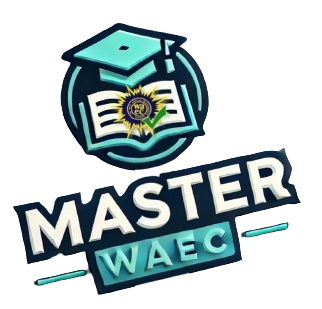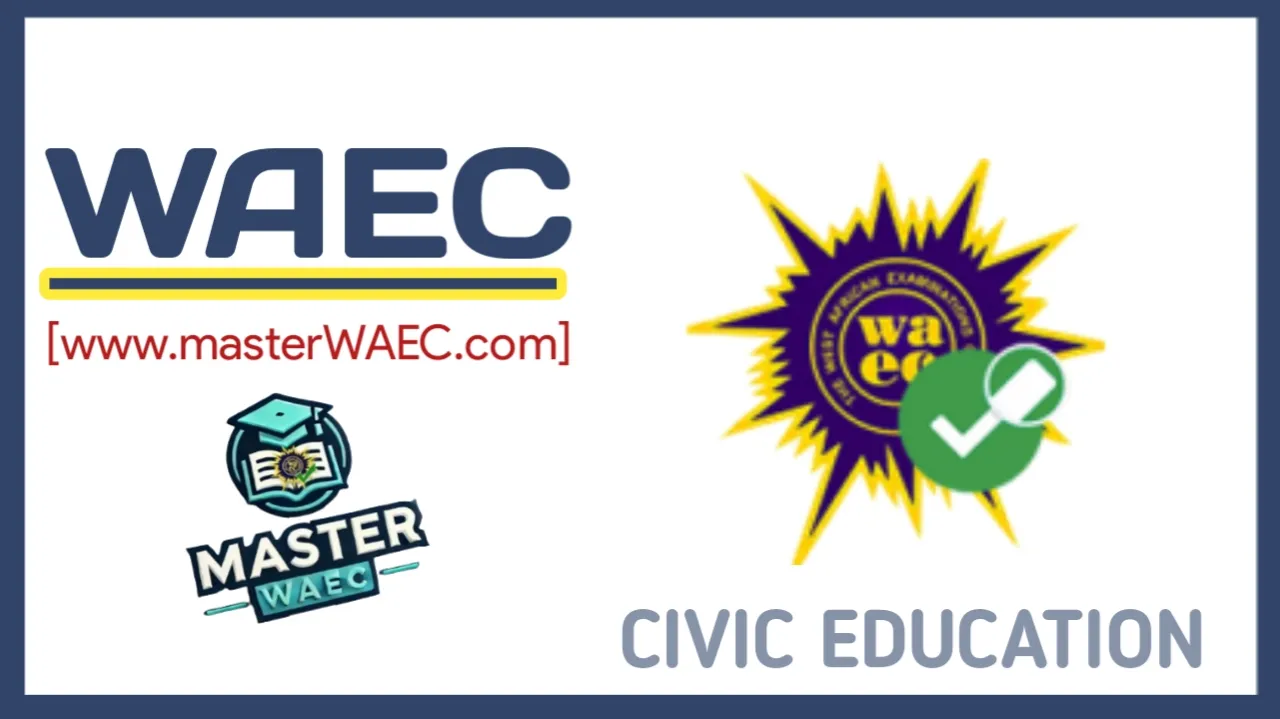The West African Examination Council, WAEC, has set the 2025 WAEC Civic Education Questions And Answers paper for 14th May 2025. Candidates are now preparing to perform well in the upcoming examination through the help of reliable resources, such as:
- 2025 WAEC Civic Education Questions and Answers
- WAEC Civic Education Expo 2025
- WASSCE Civic Education Question 2024
- WAEC Civic Education Answer 2025
If you are one of these candidates, this article has provided the step by step guide on how to prepare effectively for access to verified solutions and to succeed in your 2025 WAEC Civic Education exam.
2025 WAEC Civic Education Questions and Answers
At MasterWAEC, we are committed to the success of candidates. Our platform provides accurate and verified solutions tailored to help you boost your confidence and increase your chances of making high grades like B2, B3, and C’s.
How to Get 2025 WAEC Civic Education Questions And Answers Expo
We have made it easy for you to access WAEC Civic Education answers by providing two convenient subscription methods:
1. Online PIN (₦1000)
Get access PIN to view verified answers online on our answer page. Answers will be delivered 4 hours before the exam starts.
2. WhatsApp Delivery (₦1000)
Get the answers directly on WhatsApp after confirmation of your subscription. Get the answers delivered straight to your phone.
How to Subscribe
Here is the simple procedure one should follow in order to secure his/her access:
- Pay The Subscription Fee:
Use any preferred payment method. For account details, chat with us on WhatsApp at 08023429251.
- Provide the Required Details:
Send the following information to 08023429251 on WhatsApp:
- Evidence of payment (e.g., transfer receipt or sender’s name).
- The subject you’re subscribing for (e.g., WAEC Civic Education).
- Your phone number.
Once your payment is confirmed, the answers will be delivered based on your preferred method.
Why Choose masterWAEC?
Here are the reasons why thousands of candidates trust masterWAEC.com for their exam preparation:
1. Verified Answers: We deliver accurate solutions designed to guarantee success.
2. Timely Delivery: Answers will be delivered at least 4 hours before your exam time or by midnight.
3. Flexible Subscription Methods: Use whatever method that works for you, whether it is online PIN or WhatsApp delivery.
4. Dedicated Support: Our support team is always ready to attend to any issues or questions you might have.
Join the WAEC GCE Miracle Center
Join our private WhatsApp group, where we will be providing:
- Verified answers
- Timely updates
- Pro tips to aid your success
Conclusion
The WAEC Civic Education 2025 exam is your opportunity to show the world what you are made of and to come out with fantastic grades. With masterWAEC.com trusted resources, you can prepare with confidence and secure the results you desire.
ALSO READ:
2025 WAEC Government Questions And Answers
2025 WAEC Physical Education Questions and Answers
2025 WAEC Agricultural Science Questions And Answers
2025 WAEC Commerce Questions And Answers
2025 WAEC English Language Questions and Answers
Don’t wait, subscribe today, and let us guide you toward academic success!
For more information, reach out to us on 08023429251, and also join our WhatsApp platform for up-to-date information.
WAEC Civic Education Past Questions And Answers
Question 1: (a). What is inter-communal conflict?
Inter-communal conflict refers to disagreements, clashes, or hostilities that occur between different communities or groups within a society.
Question 1: (b). Explain four ways inter-communal conflict can be resolved
4 ways in which intet-communal conflict can be resolved are as follows:
- Dialogue and Mediation: Open discussions facilitated by neutral parties can help conflicting communities air grievances, understand each other’s perspectives, and negotiate peaceful solutions.
- Community Sensitization: Educating the communities on the importance of peaceful coexistence, tolerance, and mutual respect can reduce misunderstandings and prevent further conflicts.
- Strengthening Traditional Conflict Resolution Mechanisms: Traditional leaders or elders can use culturally accepted methods of arbitration to mediate disputes and restore harmony.
- Equitable Resource Distribution: Governments and relevant stakeholders should ensure fair allocation of resources to prevent competition and grievances among communities.
Question 2: (a). Enumerate seven similarities between the functions of traditional authority and legal-rational authority in a democracy
The seven similarities between the functions of traditional authority and legal-rational authority in a democracy are as follows:
- Maintenance of Order: Both forms of authority work to ensure peace and stability within the society by enforcing norms, rules, or laws.
- Conflict Resolution: They mediate disputes and provide mechanisms to resolve conflicts, ensuring harmony among members of the society.
- Protection of Rights: Both seek to protect the rights and welfare of individuals, though the approach may differ based on cultural or legal frameworks.
- Leadership and Governance: They provide leadership, guiding their respective communities or institutions in decision-making and policy implementation.
- Preservation of Social Values: Both authorities promote and uphold societal values, whether through traditions or formal legal codes.
- Resource Management: They play a role in managing resources to ensure fair distribution and prevent disputes, whether through customary practices or formal regulations.
- Representation: Both serve as representatives of their people, traditional authorities in cultural matters and legal-rational authorities in political or administrative affairs.
Question 2: (b). Explain four differences between traditional authority and legal-rational authority.
- Basis of Authority: Traditional authority is based on customs, traditions, and long-established practices, while legal-rational authority derives its legitimacy from formal laws, rules, and regulations.
- Source of Power: In traditional authority, power is often inherited or passed down through lineage, while legal-rational authority is granted through elections, appointments, or merit-based processes.
- Flexibility: Traditional authority tends to be rigid and resistant to change because it relies on age-old customs. Legal-rational authority is more adaptable, as laws and rules can be amended to suit changing circumstances.
- Scope of Influence: Traditional authority often operates within a specific cultural or tribal setting, whereas legal-rational authority functions within a broader national or institutional framework.
Question 3: (a). Define Constituted Authority
Constituted authority refers to individuals or institutions that hold officially recognized power and responsibility to govern, enforce laws, and maintain order within a society.
Question 3: (b). Highlight six roles of citizens in maintaining law and order
The six roles of citizens in maintaining law and order are:
- Obedience to Laws: Citizens must respect and obey the laws and regulations set by the constituted authority to ensure societal stability.
- Reporting Crimes: Citizens play a role by reporting criminal activities or suspicious behavior to law enforcement agencies to help prevent and address unlawful acts.
- Participation in Governance: By voting and engaging in public debates, citizens contribute to the creation of policies that promote law and order.
- Educating Others: Raising awareness about the importance of law and order among family, friends, and the community fosters a culture of compliance and mutual respect.
- Avoiding Vigilantism: Citizens should refrain from taking the law into their own hands and instead trust the legal system to handle disputes and punish offenders.
- Assisting Law Enforcement: Citizens can cooperate with law enforcement agencies by providing information or serving as witnesses when needed.
Question 5: Highlight three benefits of youth empowerment to national development
The 3 benefits of youth empowerment to national development are:
- Increased Crime Rates: Substance abuse often leads to criminal activities, including theft, assault, and drug trafficking, as individuals may commit crimes to feed their addiction or under the influence.
- Domestic Violence: Substance abuse can cause violent behavior within families, leading to domestic abuse, which creates an unsafe environment for children and other family members.
- Public Health Crisis: The widespread use of substances can lead to a public health crisis, with increased cases of drug-related illnesses, infections, and deaths, putting pressure on the healthcare system
Question 6: Outline five ways substance abuse can disrupt societal peace and tranquility
- Sexual Exploitation: Human trafficking often involves forcing or coercing individuals into prostitution or pornography, exploiting them for commercial sexual purposes.
- Forced Labor: Victims are trafficked and made to work under abusive conditions, such as in agriculture, construction, or domestic servitude, often with no pay and restricted freedom.
- Child Labor: Children are trafficked and forced into labor, often in hazardous conditions like mining, begging, or selling goods on the streets, depriving them of their rights and education.
- Organ Trafficking: Victims are trafficked for the illegal sale of their organs, often with deceptive promises or coercion, resulting in severe health risks or death.
- Domestic Servitude: Victims, often women and children, are trafficked and forced to work as domestic servants in private homes, enduring long hours, physical abuse, and poor living conditions.
- Illegal Adoption: Human trafficking may involve the illegal sale or abduction of children for adoption, often leading to emotional and psychological harm for the victims.
Question 7: (a). What is political participation?
Political participation refers to the activities undertaken by citizens to influence or be involved in the political and governance processes of their country. It includes actions aimed at affecting decision-making, policies, or leadership selection, either directly or indirectly.
Question 7 (b). Outline four ways by which citizens participate in the political activities of their country
The 4 ways by which citizens participate in the political activities of their country are:
- Voting in Elections: Citizens cast their votes to choose leaders or decide on policies during elections.
- Joining Political Parties: Becoming members of political parties to influence party policies and activities.
- Protesting and Demonstrations: Participating in peaceful protests to express opinions or demand changes in government policies.
- Participating in Public Debates or Discussions: Attending town halls, public forums, or debates to express views on political issues.
Question 8: (a). Define the term “pillars of democracy”
Pillars of democracy refers to the fundamental principles or institutions that support and sustain a democratic system of governance.
These include key components such as the rule of law, separation of powers, free and fair elections, an independent judiciary, a free press, and respect for human rights, which collectively ensure the proper functioning and stability of democracy.
Question 8: (b). Highlight six roles played by the police in strengthening democracy
- Maintaining Law and Order: Ensuring peace and stability by preventing and controlling crime.
- Protecting Citizens’ Rights: Safeguarding the fundamental rights and freedoms of individuals.
- Enforcing the Rule of Law: Ensuring that laws are upheld without bias or discrimination.
- Ensuring Electoral Security: Providing security during elections to enable free, fair, and transparent processes.
- Promoting Accountability: Investigating and preventing corruption and abuse of power within the society.
- Community Engagement: Building trust and collaboration with citizens to address local issues.
- Responding to Emergencies: Providing timely assistance in crises or disasters to protect lives and property.
- Upholding Justice: Supporting judicial processes by investigating crimes and gathering evidence.
Question 9: (a). What is public service?
Public service refers to the activities, roles, and responsibilities carried out by government agencies and institutions to provide essential services, implement policies, and promote the welfare and well-being of citizens. It encompasses all functions performed by civil servants, government officials, and public sector workers to meet the needs of society.
Question 9: (b). Highlight six functions of the public service
- Policy Implementation: Ensuring that government policies and programs are effectively executed.
- Service Delivery: Providing essential services such as education, healthcare, water supply, and transportation to the public.
- Law Enforcement: Upholding laws and regulations to maintain peace, order, and security.
- Economic Development: Supporting infrastructure development, trade, and investments to boost the economy.
- Regulation and Oversight: Monitoring and regulating industries, businesses, and other entities to ensure compliance with laws.
- Public Administration: Managing the day-to-day activities of government and its institutions effectively.

Kolade Kayode, known as Mr. KK, I am a Nigerian education blogger and founder of MasterWAEC.com. Passionate about student success, I simplifies WAEC exam preparation with accurate tips and resources to help students excel.


11 thoughts on “2025 WAEC Civic Education Questions and Answers”